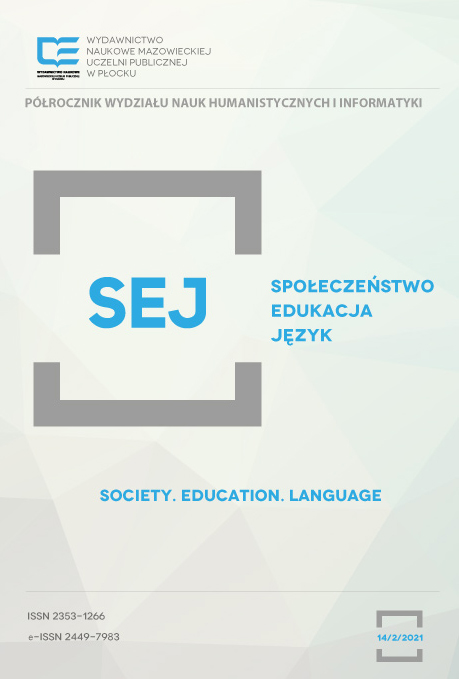COMPETENCES IN DISTANCE EDUCATION OF THE 21ST CENTURY. DIRECTIONS, CONCEPTS, NEW CHALLENGES
DOI:
https://doi.org/10.19251/sej/2021.14.2(1)Keywords:
distance education, competence, technology, coronavirus pandemic, competence managementAbstract
The main objective of this paper is to define the type and specificity of competencies in distance education during the coronavirus pandemic that may be gained and broadened by pupils and students. The following questions were asked to achieve this objective: What is competence? Which competencies are mainly transferred by online education? What is the global experience in distance education during the coronavirus pandemic? Is the time of distance education a real opportunity to further develop competence? Answers to these questions provided based on the analysis of the most recent literature on the subject, in particular studies on distance education, will make it possible to present new paradigms and challenges in this area.
References
Argyle, Michael. 1999. The Psychology of Interpersonal Behavior. London: Penguin UK.
Bozkurt, Aras, Sharma, Ramesh C. 2020. Emergency remote teaching in a time of global crisis due to CoronaVirus pandemic. Asian Journal of Distance Education 15, i-IV. DOI: 10.5281/zenodo.3778083.
Cabaj, Magdalena, Rewerski, Tomasz. 2005. Inteligencja emocjonalna i kompetencje społeczne u osób pracujących i bezrobotnych. Polityka Społeczna 2, 8-11.
Chinelatto, Lucas, Costa, Thamara R., Medeiros, Victor M., Boog, Gustavo H.P., at al. 2020. What You Gain and What You Lose in COVID-19: Perception of Medical Students on their Education. Clinics, 75, e2133. DOI: 10.6061/clinics/2020/e2133.
Czerepaniak-Walczak, Maria. 2020. Kompetencja: słowo kluczowe czy „wytrych" w edukacji?, http://repozytorium.amu.edu.pl:8080/bitstream/10593/6514/1/04_Maria_Czerepaniak_Walczak_KOMPETENCJA_S%C5%81OWO_KLUCZOWE_53-66.pdf (access: 13.10.2021).
Drzewiecki, Piotr, Dąbrowskia, Anna, Górecka, Dorota et al. 2012. Cyfrowa przyszłość. Katalog kompetencji medialnych i informacyjnych. Warszawa: Fundacja Nowoczesna Polska.
Iivari, Netta, Sharma, Sumita, Ventä-Olkkonen, Leena. 2020. Digital transformation of everyday life – How COVID-19 pandemic transformed the basic education of the young generation and why information management research should care? https://www.sciencedirect.com/science/article/pii/S0268401220310264 (access: 13.10.2021).
Jonek-Kowalska, Izabela, Wodarski, Krzysztof, Rola edukacji akademickiej w kształtowaniu kompetencji przyszłości w kontekście wydatków na szkolnictwo wyższe w Polsce. Zeszyty Naukowe. Organizacja i Zarządzanie/Politechnika Śląska 124, 33-42. DOI: 10.29119/1641-3466.2018.124.3.
Kompetencja. 2000. In: Etymologiczny słownik języka polskiego, T. 1. Ed. A. Bańkowski. Warszawa: Wydawnictwo Naukowe PWN.
Kompetencja. 2005. In: Słownik języka polskiego PWN. Ed. E. Sobel. Warszawa: Wydawnictwo Naukowe PWN.
Kompetencja. 2020. In: Słownik języka polskiego. Ed. W. Doroszewski, http://sjs.pwn.pl/doroszewski/kompetencja;5441246.html (access: 13.10.2021).
Kompetentny (2003). In: Uniwersalny słownik języka polskiego. Vol. 2. Ed. S. Dubisz. Warszawa: Wydawnictwo Naukowe PWN.
König, Johannes, Jäger-Biela, Daniela J., Glutsch, Nina. 2020. Adapting to online learning when COVID-19 school closing: Teacher Education and Teacher Competences Among Early Car Teacher Education in Germany. European Journal of Teacher Education 43, 608 -622, DOI: 10.1080 / 02619768.2020.1809650.
Kozma, Robert B. 2011. ICT, Education Transformation, and Economic Development: An Analysis of the US National Educational Technology Plan. E-Learning and Digital Media 8 (2), 106–120. DOI: 10.2304/elea.2011.8.2.106.
Kwiatkowski, Stefan. 2018. Kompetencje przyszłości. In. Kompetencje przyszłości. Ed. S. Kwiatkowski. Warszawa: Wydawnictwo FRSE.
Łukasiewicz, Katarzyna. 2019. Digital competences in supply chain management. Ekonomika i Organizacja Logistyki 4, 85–96. DOI: 10.22630/EIOL.2019.4.4.35.
Marcyński, Krzysztof. 2017. Kompetencja komunikacyjna. Studium medioznawcze, Warszawa: Wydawnictwo Naukowe UKSW.
Matusiak, Renata. 2020. Kompetencje medialne, informacyjne i cyfrowe a kształcenie w społeczeństwie informacyjnym. Szkoła – Zawód – Praca 19, 64-80. DOI: 10.34767/SZP.2020.01.04.
McClelland, David. 1973. “Testing for Competence Rather Than for Intelligence”. American Psychologist 28(1), 1–14.
Netta, Ivari, Sumita, Sharma, Leena, Ventä-Olkkonen. 2020. Digital transformation of everyday life – How COVID-19 pandemic transformed the basic education of the young generation and why information management research should care? International Journal of Information Management 55, 102-183, DOI: 10.1016/j.ijinfomgt.2020.102183.
OECD Future of Education and Skills 2030, Conceptual learning framework. Transformative Competencies For 2030, https://www.oecd.org/education/2030-project/teaching-and-learning/learning/transformative-competencies/Transformative_Competencies_for_2030_concept_note.pdf (access: 12.10.2021).
Pew Research Center. 2020. Experts Predict More Digital Innovation by 2030 Aimed at Enhancing Democracy. https://www.pewresearch.org/internet/2020/06/30/experts-predict-more-digital-innovation-by-2030-aimed-at-enhancing-democracy/ (access: 13.11.2020).
Skills development in the time of COVID-19: Taking stock of the initial responses in technical and vocational education and training, https://www.ilo.org/wcmsp5/groups/public/---ed_emp/---ifp_skills/documents/publication/wcms_766557.pdf (access: 22.10.2021).
Sun, Litao, Tang, Yongming, Zuo, Wie. 2020. Coronavirus pushes education online. Nature Materials 19, 687, DOI: 10.1038/s41563-020-0678-8.
